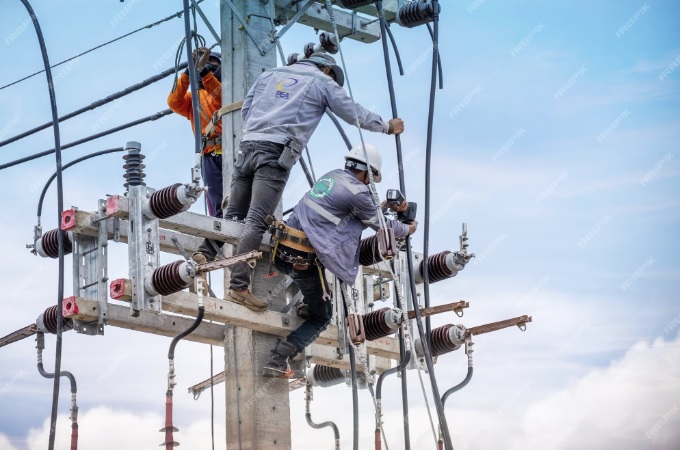A career as a Line Installer and Repairer offers a unique blend of technical knowledge and physical strength, combined with the opportunity to work outdoors and contribute to the vital infrastructure of society. This guide provides an in-depth look at the roles, responsibilities, qualifications, and career prospects for those considering this profession.

Table of Contents
- 1 Understanding the Role of Line Installers and Repairers
- 2 Educational Requirements for Line Installers and Repairers
- 3 Job Outlook for Line Installers and Repairers
- 4 Salary and Compensation
- 5 Certification and Licensing
- 6 Prospects for Advancement
- 7 Risks and Challenges
- 8 Frequently Asked Questions
- 8.1 What is a line installer job description?
- 8.2 What qualities do electrical power line installers and repairers need?
- 8.3 What skills do you need to be a line installer?
- 8.4 What is the responsibility of a lineman?
- 8.5 How to be a lineman?
- 8.6 What soft skills do you need to be a lineman?
- 8.7 What skills does a lineman have?
- 8.8 What are the pros and cons of being a lineman?
- 8.9 What does a lineman do in a day?
- 8.10 What do lineman do on a daily basis?
Understanding the Role of Line Installers and Repairers
Line Installers and Repairers, often known as line workers, play an essential role in setting up and maintaining the intricate network of electrical power systems and telecommunications cables, including fiber optics. They work with a vast array of equipment, from traditional electrical wires to modern fiber optic cables, to ensure the smooth and efficient delivery of power and communication services.
Job Description of Line Installers and Repairers
The responsibilities of line workers are diverse and challenging. They are involved in the installation, maintenance, and repair of power lines that distribute electricity, as well as the cables used for telecommunications.
Duties of Electrical Power-Line Installers and Repairers
These professionals are responsible for installing, maintaining, and repairing the power lines that transport electricity. They identify defective devices, such as voltage regulators, transformers, and switches, and inspect and test power lines and auxiliary equipment. They also string power lines between poles, towers, and buildings, and climb poles and transmission towers to reach equipment. Safety standards and procedures are paramount in their work.
Duties of Telecommunications Line Installers and Repairers
These line workers install, maintain, and repair telecommunications equipment. They inspect or test lines or cables and lay underground cables, including fiber optic lines, directly in trenches. They also install aerial cables, including over lakes or across rivers, and set up service for customers.
Specialization in the Field
Line Installers and Repairers can specialize in different areas depending on the type of network and industry in which they work:
Electrical Power-Line Installers and Repairers
These professionals install and maintain the power grid, the network of power lines that moves electricity from generating plants to customers. They work with high-voltage electricity and are often required to travel to various locations to service transmission lines and towers.
Telecommunications Line Installers and Repairers
These line workers maintain and install the lines and cables used by network communications companies. They use different types of cables, including fiber optic cables, and use specialized equipment to test and troubleshoot cables and networking equipment.
Educational Requirements for Line Installers and Repairers
Most companies require a high school diploma or equivalent for entry-level positions. Candidates with a basic knowledge of algebra and trigonometry are preferred.
Technical Knowledge
Technical knowledge of electricity or electronics, obtained through military service, vocational programs, or community colleges, can be advantageous. Many community colleges offer programs in telecommunications, electronics, or electricity. Some programs collaborate with local companies to provide one-year certificates that emphasize hands-on fieldwork.
Training and Apprenticeships
Most line installers and repairers must complete apprenticeships or other employer training programs, combining on-the-job training with technical instruction. These programs can last up to three years and are often administered by the employer and the union representing the workers.
Job Outlook for Line Installers and Repairers
The job outlook for line installers and repairers is promising, with an expected growth rate of 8% from 2016 to 2026, which is as fast as the average growth rate for all occupations. The demand for skilled workers in this field is driven by the expanding electrical grid and the construction of new broadband infrastructure.
Salary and Compensation
According to recent data, the median annual wage for electrical power-line installers and repairers was $78,310, while for telecommunications line installers and repairers, it was $60,190. The earning potential varies depending on the industry, location, and level of experience.
Certification and Licensing
While not mandatory, certification is available for line installers and repairers from several associations, such as the Electrical Training ALLIANCE and The Fiber Optic Association. These certifications can enhance job prospects and demonstrate professional competence.
Prospects for Advancement
Entry-level line workers often begin with an apprenticeship, which includes both classroom training and hands-on work experience. As they acquire additional skills from experienced workers, they can progress to more complex tasks. With several years of experience, line workers can advance to more sophisticated maintenance and repair positions, supervisory roles, or training positions.
Risks and Challenges
The work of line installers and repairers can be physically demanding and potentially hazardous. They often have to work at great heights, in confined spaces, and under challenging weather conditions. Strict adherence to safety standards and procedures is crucial to minimize the risks associated with this profession.
Frequently Asked Questions
What is a line installer job description?
A line installer is responsible for installing new cables for construction contractors, utilities, or telecommunications companies. This involves digging underground trenches or erecting utility poles and towers to carry the wires and cables. They also use a variety of construction equipment and install the new cable once the poles, towers, tunnels, or trenches are ready.
What qualities do electrical power line installers and repairers need?
Electrical power line installers and repairers need to have good color vision to distinguish color-coded wires and cables. They should have strong mechanical skills to repair or replace complex electrical and telecommunications lines and equipment. Physical stamina and strength are essential as the job can be physically demanding. Teamwork, technical skills, and troubleshooting skills are also important.
What skills do you need to be a line installer?
Being a line installer requires technical skills, physical strength and stamina, and an understanding of safety standards and procedures. They also need problem-solving abilities to identify and fix issues with power lines and telecommunications cables.
What is the responsibility of a lineman?
A lineman, or line installer and repairer, is responsible for installing, maintaining, and repairing power lines and telecommunications cables. They also inspect and test these lines and auxiliary equipment, and follow safety standards and procedures when performing their duties.
How to be a lineman?
Being a lineman usually requires a high school diploma or equivalent, along with technical knowledge of electricity or electronics. Most line installers and repairers must complete an apprenticeship or other employer training programs that combine on-the-job training with technical instruction.
What soft skills do you need to be a lineman?
Soft skills needed to be a lineman include teamwork, problem-solving abilities, and good communication skills. They should be able to work well with others, solve problems efficiently, and communicate effectively with colleagues and customers.
What skills does a lineman have?
A lineman has technical skills related to electricity or electronics, problem-solving skills to diagnose and fix issues, and physical skills to handle the demanding physical aspects of the job. They also have knowledge of safety standards and procedures.
What are the pros and cons of being a lineman?
The pros of being a lineman include a good income, the opportunity to work outdoors, and the satisfaction of contributing to important infrastructure. The cons include the physical demands of the job, potential hazards, and often challenging working conditions.
What does a lineman do in a day?
A lineman may spend their day installing, maintaining, or repairing power lines and telecommunications cables, inspecting and testing lines and auxiliary equipment, and following safety standards and procedures. They may also travel to different locations to service transmission lines and towers.
What do lineman do on a daily basis?
On a daily basis, a lineman may install new cable, replace aging or outdated equipment, diagnose and fix problems with power lines or telecommunications cables, and comply with safety procedures. They may also work with a team to ensure the smooth operation of the power grid and telecommunications networks.
In conclusion, a career as a Line Installer and Repairer offers a range of opportunities and challenges. It’s a profession that requires technical skills, physical strength, and a commitment to safety. Despite the potential risks and demanding nature of the job, it can be a rewarding career for those who enjoy working outdoors and contributing to the vital infrastructure of our society.


